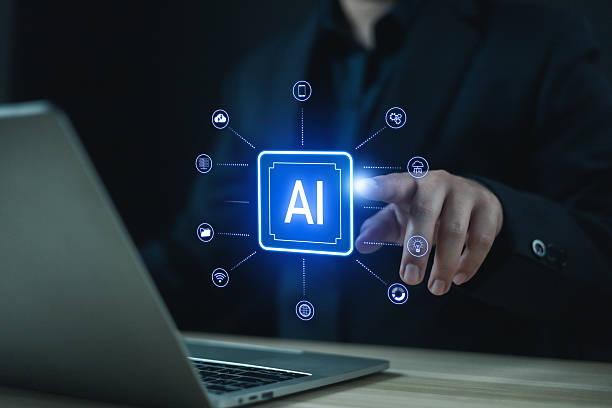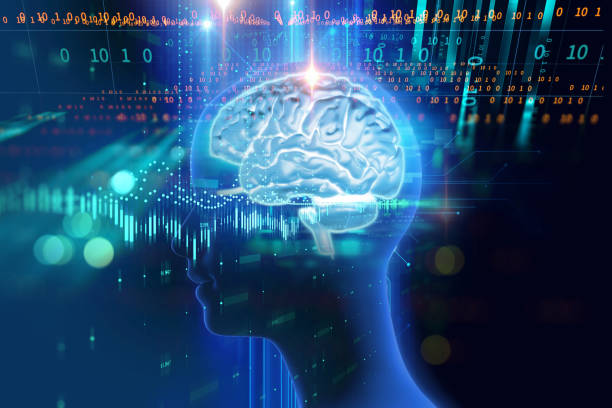What is Artificial Intelligence and What are its Applications?

Artificial Intelligence (AI) is a branch of computer science that deals with building machines and systems capable of performing tasks that typically require human intelligence.
These tasks include learning, reasoning, problem-solving, understanding natural language, and pattern recognition.
#Artificial_Intelligence is no longer a distant concept but is increasingly penetrating our daily lives.
The applications of Artificial Intelligence are vast and diverse.
In healthcare, AI is used for disease diagnosis, drug development, and personalized care.
In the automotive industry, self-driving cars use AI for navigation and accident prevention.
In finance, AI is used for fraud detection and risk management.
Even in entertainment, AI plays a significant role in recommending movies and music to users.
Artificial Intelligence is evolving rapidly, and it is expected to play a more significant role in our lives in the future.
Machine learning algorithms, a subset of AI, enable systems to learn from data and improve their performance without explicit programming.
This capability is crucial in many applications, including face recognition and natural language processing.
Ultimately, understanding Artificial Intelligence and its applications is essential for anyone who wants to operate in the modern world.
This technology not only creates new opportunities but also brings new challenges that must be addressed.
Is your current online store design causing you to lose customers and sales?
Rasaweb is your solution with modern and user-friendly online store designs!
✅ Significantly increase conversion rates and sales
✅ Create strong branding and gain customer trust
⚡ Get a free online store design consultation from Rasaweb!
Types of Artificial Intelligence: From Expert Systems to Deep Learning

Artificial Intelligence can be divided into different categories, each with its own characteristics and applications.
One common classification is based on the capabilities of intelligent systems.
In this classification, the following can be mentioned:
- Expert Systems: These systems store specialized knowledge in a specific field and can be used to solve problems and provide advice in that field.
- Machine Learning: This approach allows machines to learn from data and improve their performance without explicit programming.
Machine learning itself is divided into various sub-branches such as supervised learning, unsupervised learning, and reinforcement learning. - Deep Learning: This branch of machine learning uses deep neural networks to model data.
Deep learning has performed very well in areas such as image recognition, natural language processing, and machine translation.
In addition, Artificial Intelligence can also be classified based on the type of tasks it performs.
For example, face recognition systems, natural language processing systems, and robotics systems each perform a specific type of task.
Familiarity with different types of Artificial Intelligence helps us better understand the capabilities and limitations of this technology and use it more effectively in various fields.
Types of Artificial Intelligence Choosing the right type of AI for each application depends on various factors such as the type of data, the complexity of the problem, and the required level of accuracy.
Key Algorithms in Artificial Intelligence

Artificial Intelligence is based on various algorithms, each of which plays a specific role in performing intelligent tasks.
Some of the key algorithms in AI include:
- Decision Tree: A predictive model that uses a tree structure for decision-making.
- Support Vector Machine (SVM): A supervised learning algorithm used for classification and regression.
- Neural Networks: Models inspired by the structure of the human brain that are used to learn patterns and complex relationships in data.
- Clustering Algorithms: Used to group data based on their similarities.
- Optimization Algorithms: Used to find the best solution for a specific problem.
Each of these algorithms has its own advantages and disadvantages and is suitable for different applications.
For example, neural networks are very powerful in image recognition and natural language processing, while decision trees are more suitable for simpler and more interpretable problems.
| Algorithm | Application |
|---|---|
| Decision Tree | Classification, Regression |
| Support Vector Machine | Classification, Regression |
| Neural Networks | Image Recognition, Language Processing |
Understanding these algorithms and how they work is essential for developing efficient and effective Artificial Intelligence systems.
Choosing the right algorithm for each problem depends on various factors such as the type of data, the complexity of the problem, and the required level of accuracy.
Natural Language Processing (NLP) and its Applications

Natural Language Processing (NLP) is a branch of Artificial Intelligence that allows machines to understand, interpret, and generate human language.
NLP plays an important role in many applications, including:
- Machine Translation: Automatic translation of text from one language to another.
- Sentiment Analysis: Determining the emotions and attitudes present in a text.
- Chatbots: Computer programs that can converse with humans in natural language.
- Text Summarization: Generating short and useful summaries of long texts.
- Speech Recognition: Converting human speech into text.
NLP uses various algorithms and techniques to process natural language, including language models, neural networks, and machine learning algorithms.
These algorithms help machines learn patterns and relationships in language and perform various NLP tasks.
NLP is rapidly advancing and is expected to play an increasingly important role in human-machine interaction in the future.
Natural Language Processing Using NLP, machines can communicate more effectively with humans and assist them in performing various tasks.
Developers and researchers are striving to make NLP systems smarter and more efficient to solve more complex challenges in the field of language.
Are you losing potential customers due to an unprofessional website? Rasaweb is your answer! With our specialized corporate website design services:
✅ Enhance the credibility and standing of your business
✅ Experience attracting more targeted customers
⚡ Take action now to receive a free consultation!
Machine Learning and its Different Methods

Machine Learning is one of the most important branches of Artificial Intelligence that allows machines to learn from data and improve their performance without explicit programming.
There are different methods for machine learning, each with its own characteristics and applications:
- Supervised Learning: In this method, the machine is trained using labeled data.
The goal is to learn a function that can map inputs to correct outputs. - Unsupervised Learning: In this method, the machine is trained using unlabeled data.
The goal is to find hidden patterns and structures in the data. - Reinforcement Learning: In this method, the machine learns how to act by interacting with an environment in order to earn more reward.
Each of these methods has its own advantages and disadvantages and is suitable for different applications.
For example, supervised learning is suitable for classification and regression, while unsupervised learning is suitable for clustering and dimensionality reduction.
Machine Learning Reinforcement learning is suitable for training robots and game systems.
Choosing the right machine learning method for each problem depends on various factors such as the type of data, the complexity of the problem, and the required level of accuracy.
Developers and researchers are striving to develop new and more efficient methods for machine learning to solve more complex challenges in various fields.
Challenges and Limitations of Artificial Intelligence

Artificial Intelligence, despite its remarkable progress, still faces numerous challenges and limitations.
Some of these challenges include:
- Need for Large Amounts of Data: Many Artificial Intelligence algorithms, especially deep learning algorithms, require very large amounts of data for training.
- Interpretability: Some Artificial Intelligence models, especially deep neural networks, are very complex and difficult to understand how they make decisions.
- Bias: If the data used to train Artificial Intelligence models is biased, the models will also be biased.
- Security: Artificial Intelligence systems can be vulnerable to cyber attacks.
- Ethics: The use of Artificial Intelligence can raise new ethical issues.
These challenges and limitations show that Artificial Intelligence is still in the early stages of its development and requires more research and development.
Artificial Intelligence Challenges Researchers and developers are striving to overcome these challenges and develop safer, more reliable, and more interpretable Artificial Intelligence systems.
In addition, ethical issues related to the use of Artificial Intelligence must be seriously considered.
For example, automated decision-making by Artificial Intelligence systems can have significant impacts on people’s lives, and it must be ensured that these decisions are fair and unbiased.
The Future of Artificial Intelligence and its Impact on Our Lives

Artificial Intelligence is rapidly advancing and is expected to have profound impacts on our lives in the future.
Some of these impacts include:
- Automation: Artificial Intelligence can automate many repetitive and tedious tasks, allowing humans to focus on more creative and important tasks.
- Improved Productivity: Artificial Intelligence can increase productivity in many industries.
- Development of New Products and Services: Artificial Intelligence can lead to the development of new products and services that were not previously possible.
- Improved Quality of Life: Artificial Intelligence can help improve the quality of life in various areas such as healthcare, education, and transportation.
Of course, the advancement of Artificial Intelligence can also bring challenges.
For example, automation can lead to job losses and require retraining and career changes.
The Future of Artificial Intelligence Also, ethical issues related to the use of Artificial Intelligence must be seriously considered.
Overall, the future of Artificial Intelligence is very bright, and it is expected that this technology will play an important role in shaping the world of the future.
However, the challenges and limitations of Artificial Intelligence should also be considered, and efforts should be made to use this technology responsibly and ethically.
| Area | Impacts of Artificial Intelligence |
|---|---|
| Healthcare | Disease Diagnosis, Drug Development |
| Automotive Industry | Self-Driving Cars |
| Finance | Fraud Detection, Risk Management |
Ethical Issues in Artificial Intelligence

The development and use of Artificial Intelligence raise important ethical issues that must be considered.
Some of these issues include:
- Bias: Artificial Intelligence models can be biased if the data used to train them is biased.
- Accountability: If an Artificial Intelligence system makes a mistake, who is responsible?
- Privacy: Artificial Intelligence systems can collect and process people’s personal information.
How can people’s privacy be protected? - Transparency: The decisions of Artificial Intelligence systems should be transparent and explainable.
- Security: Artificial Intelligence systems must be protected against cyber attacks.
These ethical issues show that the development and use of Artificial Intelligence must be carried out carefully and with attention to human values.
Artificial Intelligence Ethics Laws and regulations should be put in place to regulate the development and use of Artificial Intelligence to prevent abuse of this technology.
In addition, people should be given the necessary training to be able to use Artificial Intelligence responsibly and ethically.
This training should include topics such as bias, accountability, privacy, and transparency.
Did you know that 94% of users’ first impressions of a business are related to its website design? With professional corporate website design by **Rasaweb**, turn this initial impression into an opportunity for growth.
✅ Attract more customers and increase sales
✅ Create credibility and trust in the eyes of the audience⚡ Get a free website design consultation!
Resources and Tools for Learning Artificial Intelligence

If you are interested in learning Artificial Intelligence, various resources and tools are available to you.
Some of these resources include:
- Online Courses: Educational platforms like Coursera, edX, and Udacity offer a variety of courses in the field of Artificial Intelligence.
- Books: There are many books on Artificial Intelligence that you can use to learn basic and advanced concepts.
- Scientific Articles: Scientific articles cover the latest advances in Artificial Intelligence.
- Software Tools: Tools like TensorFlow, Keras, and PyTorch help you implement and train Artificial Intelligence models.
- Online Communities: Online communities like Stack Overflow and Reddit are great places to ask questions and exchange ideas with other Artificial Intelligence enthusiasts.
Using these resources and tools, you can gradually increase your knowledge and skills in the field of Artificial Intelligence and become an expert in this field.
Learning Artificial Intelligence Starting to learn Artificial Intelligence can be challenging, but with effort and perseverance, you can succeed.
To get started, you can familiarize yourself with basic concepts such as machine learning, neural networks, and natural language processing.
Then, you can implement and train simple Artificial Intelligence models using software tools.
Finally, you can keep your knowledge up-to-date by reading scientific articles and participating in online communities and familiarize yourself with the latest advances in this field.
Summary and Conclusion

Artificial Intelligence is a powerful and evolving technology that can have profound impacts on our lives.
This technology creates new opportunities to improve the quality of life, increase productivity, and develop new products and services.
However, the challenges and limitations of Artificial Intelligence should also be considered, and efforts should be made to use this technology responsibly and ethically.
In this article, we examined the basic concepts of Artificial Intelligence, the types of algorithms and machine learning methods, the applications of Artificial Intelligence in various fields, the challenges and limitations of Artificial Intelligence, the ethical issues related to Artificial Intelligence, and the resources and tools for learning Artificial Intelligence.
We hope that this article has helped you to better understand Artificial Intelligence and be able to use this technology more effectively in your life and work.
Artificial Intelligence Learning and understanding Artificial Intelligence is essential for anyone who wants to operate in the modern world.
This technology not only creates new opportunities but also brings new challenges that must be addressed.
Frequently Asked Questions
| Question | Answer |
|---|---|
| What is artificial intelligence? | It is a simulation of human intelligence in machines programmed to think like humans and mimic their actions. |
| What are the main branches of artificial intelligence? | They include machine learning, deep learning, natural language processing, computer vision, and robotics. |
| What is machine learning (Machine Learning)? | It is a branch of artificial intelligence that focuses on enabling systems to learn from data and identify patterns without explicit programming. |
| Give examples of artificial intelligence applications in our daily lives. | Voice assistants (such as Siri and Alexa), recommendation systems in Netflix and Amazon, self-driving cars, and facial recognition programs. |
| What is Deep Learning? | It is a subset of machine learning that uses multiple layers (deep) of artificial neural networks to process large amounts of data. |
| What is Natural Language Processing (NLP)? | It is a branch of artificial intelligence that focuses on enabling computers to understand, interpret, and generate human language. |
| What are some of the ethical concerns related to artificial intelligence? | They include bias in data, privacy, job loss, and liability in the event of errors. |
| What are the main benefits of artificial intelligence? | Increasing efficiency, improving decision-making, automating repetitive tasks, and discovering complex patterns in data. |
| How is artificial intelligence used in the healthcare field? | In diagnosing diseases, discovering drugs, analyzing medical images, and providing personalized care for patients. |
| How do you see the future of artificial intelligence? | It is expected to continue to develop at a rapid pace, affecting all aspects of human life, from industry to education and entertainment. |
And other Rasa Web advertising agency services in the field of advertising
Intelligent Link Building: Designed for businesses looking to engage users by customizing the user experience.
Intelligent Content Strategy: Combining creativity and technology to increase click-through rates with an SEO-driven content strategy.
Intelligent Marketplace: A professional solution for increasing sales by focusing on optimizing key pages.
Intelligent Customer Journey Map: Combining creativity and technology to increase sales through custom programming.
Intelligent Digital Advertising: An effective tool for online growth by optimizing key pages.
And more than hundreds of other services in the field of internet advertising, advertising consulting, and organizational solutions
Internet Advertising | Advertising Strategy | Advertorials
Sources
What is Artificial Intelligence and What are its applications?
,What is Artificial Intelligence (AI)? — In Simple Terms + Applications
,What is Artificial Intelligence? And how will it transform the world?
,What is Artificial Intelligence (AI)? Its Advantages and Disadvantages
? Are you ready to transform your business in the digital world? Rasaweb Digital Marketing Agency offers a comprehensive solution for your growth and visibility with expertise in professional website design, SEO, and content marketing. Discover the true potential of your brand with us.
📍 Tehran, Mirdamad Street, next to the Central Bank, South Kazerun Alley, Ramin Alley No. 6



